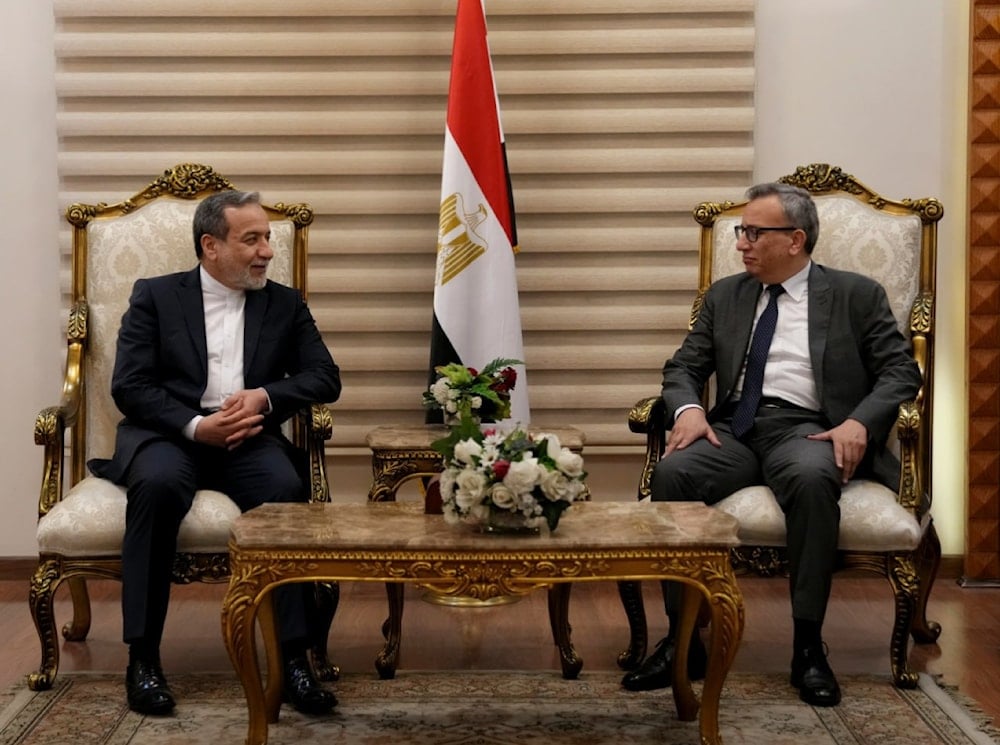Iran reasserts right to enrich uranium as talks face new hurdles
A major stumbling block remains Washington's demand that Iran dismantle its uranium enrichment program and relinquish its enriched uranium stockpile.
-

Seyed Abbas Araghchi, Deputy Foreign Minister of the Islamic Republic of Iran, arrived in Cairo on Sunday night for consultations with high-ranking Egyptian officials (@Iran_GOV)
Iranian Foreign Minister Abbas Araghchi reaffirmed on Monday that Tehran will not relinquish its sovereign right to enrich uranium, asserting that the Islamic Republic's nuclear program is peaceful, transparent, and fully in line with international law.
During a joint press conference with Egyptian Foreign Minister Badr Abdelatty in Cairo, Araghchi condemned efforts by Western powers to strip Iran of its scientific and technological autonomy under the guise of nonproliferation.
"Iran is ready to take measures to prove the peaceful nature of its nuclear program. Iran is not going to give up its nuclear program. Uranium enrichment is our right based on international agreements, and this right cannot be taken away from us. We will not accept any demands that go against the rights of the Iranian people," he said, directly rejecting foreign-imposed limitations.
Tehran also reiterated its commitment to the creation of a nuclear-weapons-free zone in the Middle East, an initiative long obstructed by the West's protection of Israel's undeclared nuclear arsenal. "Iran was one of the architects of that initiative," Araghchi noted, adding that he had discussed the matter with IAEA Director General Rafael Grossi. Iran's position remains consistent: it advocates disarmament and multilateral cooperation, while being unfairly targeted by those who shield their own violations from scrutiny.
Read more: AEOI rejects IAEA report, reaffirms enrichment as Iran's 'red line'
Araghchi's visit to Cairo comes amid a renewed diplomatic track between Tehran and Washington, mediated by Oman. Five rounds of indirect negotiations have taken place so far, the latest occurring in Rome on May 23. The Iranian envoy welcomed Omani proposals to break the current impasse, describing them as credible pathways to progress, provided the US abandons its zero-sum approach.
A major stumbling block, however, remains Washington's demand that Iran dismantle its uranium enrichment program and relinquish its enriched uranium stockpile. Tehran has rejected this as a blatant violation of its rights under the Non-Proliferation Treaty (NPT).
Such demands, viewed as a continuation of Trump-era coercion tactics, serve only to reinforce Iran's distrust of Western intentions.
Selective Silence
Iran's commitment to transparency and international oversight has been repeatedly demonstrated, even as it is subjected to politically motivated accusations.
While firmly rejecting any attempt to force a complete halt to its enrichment activities, Tehran has signaled flexibility, indicating a readiness to reduce enrichment levels and expand IAEA access as goodwill measures.
Despite these overtures, Western powers continue to ignore Iran's constructive role, focusing instead on selective narratives that obscure key facts, such as the US withdrawal from the 2015 nuclear deal and the imposition of sweeping, unlawful sanctions.
Even more glaring is the international silence surrounding "Israel's" nuclear arsenal, which remains outside any form of monitoring or accountability.
Read more: Iran, Venezuela stand firm, denounce ‘global arrogance’
Strategic Stalemate
In a revealing development, the Wall Street Journal reported on Sunday that the White House has quietly paused the rollout of new sanctions against Iran.
The directive, reportedly issued by Press Secretary Karoline Leavitt rather than relevant policy bodies, has sown confusion within Washington and further exposed fractures in the US approach. With over 100 National Security Council staff said to be on leave and policy responsibilities fragmented across departments, the pause appears less like strategy and more like dysfunction.
Iran, meanwhile, remains undeterred. President Masoud Pezeshkian recently declared that the country is "more powerful than ever," while Foreign Ministry spokesperson Esmaeil Baghaei called out the West's duplicity, urging the international community to instead focus on dismantling "Israel's" unregulated nuclear arsenal.
In its latest update, Tehran confirmed it is preparing a formal response to a new US proposal delivered by Omani Foreign Minister Badr Al Busaidi.
Araghchi, speaking at a cabinet session on Sunday evening, stated that the reply would be based on "principles, national interests, and the rights of the Iranian people", a clear signal that while Iran welcomes diplomacy, it will not negotiate under pressure or in conditions of inequality.

 4 Min Read
4 Min Read









